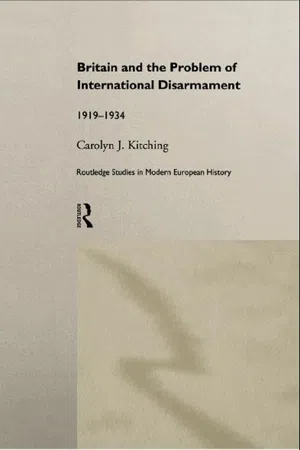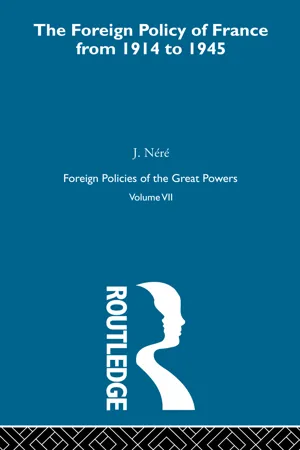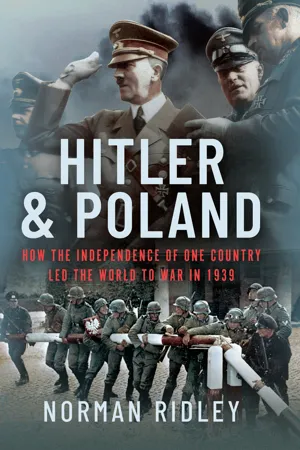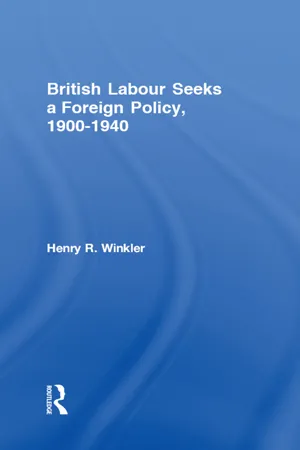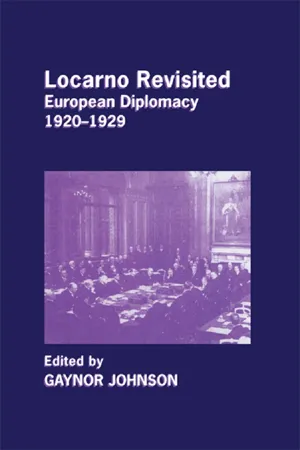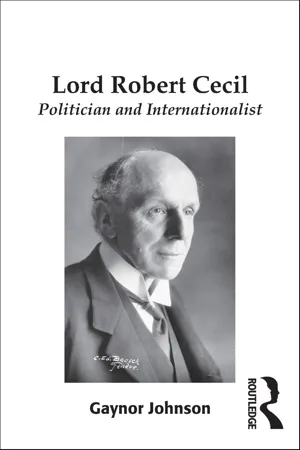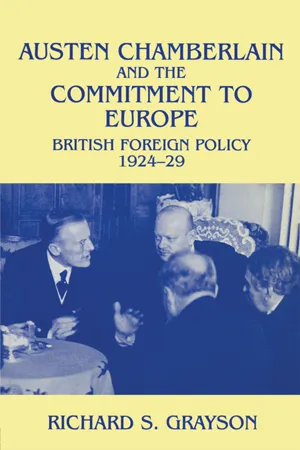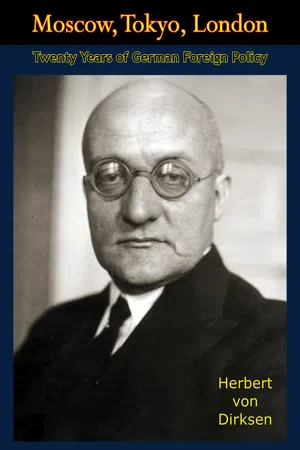History
Locarno Treaties
The Locarno Treaties were a series of agreements signed in 1925 between Germany, France, Belgium, Italy, and Britain. The treaties aimed to secure post-World War I territorial boundaries and promote peace in Europe. They also paved the way for Germany's admission to the League of Nations, marking a significant step towards international reconciliation and stability.
Written by Perlego with AI-assistance
Related key terms
8 Key excerpts on "Locarno Treaties"
- eBook - ePub
- Carolyn J. Kitching(Author)
- 2003(Publication Date)
- Routledge(Publisher)
37 In themselves, the Locarno Treaties created neither security nor disarmament. Indeed, the guarantees contained within the treaties were perhaps too vague to be meaningful; how could Britain, for example, draw up concrete military plans if she did not know against whom they would be directed, or with whom joint planning arrangements should be made? The general atmosphere, however, improved markedly. America approved of the treaties, as they seemed to herald a period of stability in Europe; the Italians approved, because their international status was enhanced; Britain and the Dominions approved because stability had been achieved without any precise military commitments having been made. For their part, the Germans were once again legitimate members of the European community and had protected themselves against renewed incursions by the French. The French gained an illusion of security.A further significant consequence of the Locarno Treaties was that Germany renewed the Treaty of Rapallo, the joint treaty of friendship and mutual cooperation signed with the Soviet Union in 1922. The Soviet Union feared that Germany was moving too far towards the West, and the West, as Chamberlain had pointed out, feared the influence of the Soviet Union. If the Locarno Treaties were not examined too closely, it would seem that a large step had been taken towards addressing the problems of German revisionism and French security. In reality the commitments contained in the Treaties, were hollow: France had been given no firm military commitment—in the sense of British or Italian forces allocated specifically to the defence of France, or even staff talks—whilst Germany had retained her freedom to revise her Eastern frontiers. In spite of the apparent euphoria which followed the signing of the treaties, and the stress placed on the ‘Locarno spirit’ during the next five years, France was not fooled by the illusion. In June 1927, the Foreign Office was to observe ‘a certain change of temper’ on the part of France and Belgium in regard to their relations with Germany in that they were ‘informed less completely than formerly by the Locarno spirit’.38 In response to this observation, the Marquess of Crewe, British Ambassador at Paris, stated that ‘the Locarno Treaties have never been considered here to provide a complete solution of the problem of French security’ but that ‘the better informed sections of French public opinion are fully aware that the Locarno guarantees are as much as any British government is ever likely to be in a position to concede to France’.39 - eBook - ePub
- Nere(Author)
- 2013(Publication Date)
- Routledge(Publisher)
If we wish to pass judgment on the Locarno Agreements today, we must obviously view with considerable detachment the vehement outbursts which greeted their publication. Germany renounced the restitution of Alsace-Lorraine, and even remilitarization of the Rhineland, no longer under coercion, but of its own free will; this appeared to be a considerable concession, but Stresemann explained constantly that in his opinion Germany was not in a condition to wage war against France in the foreseeable future. France renounced acting alone against Germany – except in the case of her eastern allies – but this was exactly what Briand, who was aware of the disproportion of the actual forces of the two countries, wished most of all to avoid. Britain and Italy acquired, or thought they acquired, considerable diplomatic prestige as arbiters of Europe, or at least, of the main European question: doubtless they were undertaking to guarantee the Franco-German and Germano-Belgian frontiers and the demilitarization of the Rhineland, but the execution of this guarantee, subject to the procedures of the League of Nations, afforded by that very fact a wide margin of interpretation. The Locarno Treaty was above all a beginning, and very different consequences were expected from it: for the Germans, a revision of the peace treaties, for many Frenchmen, their consolidation. Thus it was an eminently diplomatic piece of work, which consisted of postponing the problems and relying on time to solve them.One of the conditions – or necessary consequences – of the Locarno negotiations was the entry of Germany into the League of Nations. This had been regarded by many Germans and British as bound to occur a very short time after the signing of the peace treaty and as a logical consequence of it. At this time France had reservations; she considered that Germany must first of all prove its good intentions and good conduct for a certain number of years. The difficulties raised by the question of German disarmament and that of reparations quite naturally delayed the admission of Germany. - eBook - ePub
Hitler and Poland
How the Independence of one Country led the World to War in 1939
- Norman Ridley(Author)
- 2023(Publication Date)
- Frontline Books(Publisher)
Austen Chamberlain claimed that the Locarno Treaties were ‘the real dividing line between the years of war and the years of peace’ but in practice they did little more than paper over the cracks that had been opened up by, and widened since, the Versailles Treaty. 2 Stresemann’s threefold strategy was clear: he would try to avoid any deal that recognised Poland’s borders, he would try to prevent France from acting as a guarantor in any arbitration with Poland and, most importantly, he would try to get German exemption from Article 16 of the League Covenant, which would allow it to remain neutral in any new Russo-Polish war. Achieving all three would, he hoped, mollify the Soviet Union and assure it of Germany’s friendly relations while maintaining their joint pressure on Poland. His impressive diplomatic skills came to the fore and allowed him to nuance his position depending on his audience. To the League he offered full moral support but claimed that a disarmed Germany could not be expected to give military support to any other member (Poland) in the event of war. To the Soviet Union he gave assurances that, as a member of the League, Germany would act in Soviet interests. To the British and French, he rejected non-aggression treaties but offered to sign arbitration treaties that considered only peaceful solutions. This obscure distinction left other delegates bemused but allowed them to move on. To his domestic audience, Stresemann called his approach a ‘façade’ to challenge French insistence that Poland be included in a security pact and implied that there was little of significance in any such arbitration treaty. Locarno proved to be a triumph for German diplomacy, a failure for the Soviet Union and a disaster for Poland. According to the arbitration treaty between Germany and Poland, if war broke out France would not be able to offer immediate help to Poland unless or until the League of Nations ruled whether or not Germany had been the aggressor - eBook - ePub
- Henry Winkler(Author)
- 2017(Publication Date)
- Routledge(Publisher)
Here he followed the advice of the minority of the Advisory Committee, accepting the Pact as a first step towards the idea of the Geneva Protocol. It contained all the elements of the latter, but without disarmament it posed risks far greater than those imputed to the Protocol. Its negotiation and conclusion outside the orbit of the League of Nations was disturbing. One prescient comment noted that the major flaw in Locarno was its failure to deal with the Eastern frontiers: “The lighting of the match will take place, if it takes place at all, in Middle and Eastern Europe.” His skillful Parliamentary performance enabled MacDonald to argue that Locarno presented an opportunity to go on to the building of a viable European system, in effect keeping open Labour’s options for the time it might again be in office. 19 Following his lead, the Labour MPs voted overwhelmingly for ratification of the Locarno Agreements, the exception being thirteen MPs mostly from the ILP ranks, who joined Ponsonby and Lansbury in deploring the concessions made by Labour’s leadership to the initiatives of the Tory government. When the Executive Committee of the Labour and Socialist International met in London in early November, it substantially accepted MacDonald’s argument. Persisting in the view that the security of European peace could most effectively be achieved by means of the Geneva Protocol and regretting that the Tory government of Great Britain had wrecked it for the time being, the International committee nevertheless greeted the Locarno agreements as a first move towards the pacification of Europe - eBook - ePub
Locarno Revisited
European Diplomacy 1920-1929
- Gaynor Johnson(Author)
- 2004(Publication Date)
- Routledge(Publisher)
7 Germany, Russia and Locarno: The German-Soviet Trade Treaty of 12 October 1925 DAVID CAMERON AND ANTHONY HEYWOOD On 12 October 1925, four days before the initialing of the Western security pact in Locarno, Germany and the Soviet Union signed a trade treaty in Moscow. The timing of these two events was more than coincidental. The timing of the signing of the trade treaty and indeed the very fact of its signing was closely connected to events at Locarno; the German-Soviet trade treaty was part of Stresemann's policy of an East- West balance. The German-Soviet trade treaty has, however, received much less attention from scholars than has the Locarno Treaty. Even among historians of German-Soviet relations in the 1920s, the trade treaty of 1925 has generally received only passing mention. Even if the importance of German-Soviet economic relations during this period has been given a good deal of attention by historians, the trade treaty of 1925 has not. 1 There are a couple of reasons for this. On the one hand the trade treaty of 1925 is viewed as simply that, a trade treaty Consequently it is seen in a much more mundane light by historians than the Treaty of Rapallo or the secret military co-operation between the Reichswehr and the Red Army. Moreover, the trade treaty was seen at the time of its signing as an agreement that fell far short of German expectations, if it was not seen as an outright failure in this regard. This view was widely held within the German Foreign Office as well as among German business and industrial circles. Indeed at the time of its signing there were individuals within the German Foreign Office, as well as some German industrialists and businessmen, who went so far as to argue against even signing the trade treaty. The proponents of such actions maintained that as an economic and trade agreement the trade treaty did not begin to meet the needs and expectations of the German economy - eBook - ePub
Lord Robert Cecil
Politician and Internationalist
- Gaynor Johnson(Author)
- 2016(Publication Date)
- Routledge(Publisher)
Chapter 8Land and Air Disarmament Negotiations, 1925–27
An additional feature of the ‘Locarno honeymoon’ was the willingness of the British and French governments to turn their attention more fully to the question of international disarmament. It had been debated in Paris in 1919 but little progress had been achieved beyond agreement about the reduction of German military capability. As with the question of reparations, the assumption among the peacemakers had been that the best way to bring about lasting and satisfactory levels of disarmament was through committees of experts meeting in parallel with larger diplomatic gatherings. By 1925, Cecil had already been involved in formulating a number of significant plans relating to disarmament. These had hitherto met with limited success for a variety of reasons, most of which related to the timing of the initiative in relation to other developments in international affairs. However, with the reparation question now apparently under control, with British and French security needs addressed by the Treaty of Locarno and with German membership of the League of Nations imminent, Cecil believed that the time was now right to turn his attention towards international disarmament.Cecil began the lobbying process during the summer of 1925, when he applied pressure on the Cabinet to outline a policy on disarmament. The ability to prevent war through disarmament was for Cecil, next to the development of the League of Nations, the most pressing task for the international community. As far as Cecil was concerned, only when disarmament had been achieved could the Allies justifiably call themselves the victorious powers: ‘If we can carry it out, we have practically won the victory. If we cannot – defeat is almost certain.’1 Nor was he under any illusions about how difficult it would be to achieve a domestic consensus once the British military and civil authorities and ‘powerful financial interests’ had been taken into consideration.2 - eBook - ePub
Austen Chamberlain and the Commitment to Europe
British Foreign Policy 1924-1929
- Dr Richard S Grayson, Richard S. Grayson(Authors)
- 2014(Publication Date)
- Routledge(Publisher)
5 Calming Germany: The Locarno System, 1926–29 For reasons of sound policy we desire to get rid of the control even though the Germans have not done what they agreed to do.Austen Chamberlain on the Inter-Allied Military Commission of Control, 18 Nov. 1926’1INTRODUCTIONThe Locarno system collapsed in 1936 when Hitler’s troops entered the Rhineland. But in 1929 everything seemed in order; and it is argued here that the system worked until it was overtaken by economic depression and the rise of Nazism. This chapter examines relations between Britain, France and Germany following Locarno, and considers Italy’s place in Chamberlain’s diplomacy; the main issue is Chamberlain’s understanding of Stresemann’s revisionism, and how he dealt with it. Some aspects of this have already been considered in Chapter Four ; for, after Germany joined the League of Nations, the focus of relations between the countries, over matters such as Saar railway troops, shifted to the League. However, the most important Franco-German issues remained outside the League’s remit, principally troops occupying the Rhineland, and reparations.Criticisms of the Locarno system come from Jacobson and Marks. Although Jacobson does not dismiss the stabilisation of the 1920s as years of illusion, a pause between 1919 and the mid-1930s,2 both writers argue that friendly relations between foreign ministers masked important differences. Marks sees ‘[…] a fearful France flanked by the unhappy east Europeans, trying to hide their humiliation and panic, and a resentful, revisionist Germany demanding ever more alterations in the power balance […]’; Jacobson argues that ‘[…] fundamental rivalries and antagonisms persisted through the Locarno era.’3 Furthermore, Chamberlain is specifically criticised. During the Locarno negotiations, he claimed to be an ‘honest broker’;4 afterwards, Jacobson believes, this was not true of his European policy. He views Chamberlain as basically closer to France than Germany, and not understanding German sensibilities as well as those of the French.5 An example of this was the French President’s May 1927 visit to Britain, when Chamberlain spoke to the press of the ‘Entente Cordiale’ rather than the ‘Spirit of Locarno’, causing some German anxiety. Jacobson takes this, and simultaneous discussions held between Britain and France, as indicating an ‘entente policy’.6 Is this what developed as part of Chamberlain’s policy of calming France, which was seen in Chapter Three to be central to his concept of European security? And did it undermine Locarno, making Chamberlain overlook German concerns? Fundamentally, are Jacobson and Marks right to see Locarno as failing to tackle Europe’s problems? Meanwhile, is Gilbert right when he says Locarno was Chamberlain’s ‘[…] last essay in appeasement […]’, that is, he constructed a system which he failed to maintain?7 - eBook - ePub
- Herbert von Dirksen(Author)
- 2018(Publication Date)
- Arcole Publishing(Publisher)
In a retrospective view I am inclined to agree with this opinion. The failure of Locarno—for a failure it was in the long run—evoked the most sinister consequences. It meant that Western European statesmanship had failed to reconcile Germany, to win her wholehearted collaboration in European reconstruction. She felt disappointed, almost cheated, as she had not received her reward for the goods delivered by her. It must be kept in mind that the German statesmen of this Weimar period cannot be blamed as Junkers, Fascists, reactionaries, crooks, or idiots. They were honest, capable, intelligent men, inspired by the one desire to restore their country, in collaboration with the other European nations, to an honorable position on the European continent. Their supreme effort to achieve this goal, initiated by the most capable of them, was Locarno. Together with Versailles, the non-fulfilment of President Wilson’s Fourteen Points, and the breakdown of disarmament, the failure of Locarno was one of the roots from which National Socialism sprang.5. THE EQUILIBRIUM BETWEEN RAPALLO AND LOCARNO
I have anticipated the ultimate effects of Locarno in order to give a comprehensive survey on one of the most important epochs of the Weimar Republic. When we lived through those years, these effects became visible only gradually. The immediate reactions of the swing of our foreign policy penetrated even to the Eastern Department, in so far as the Soviet Union ceased to play the predominant rôle in my work. As soon as Germany had entered the League, our minority problems on our Eastern border came to the foreground, for we, as members of the Council, had a platform on which we could plead for the Germans in the ceded territories.The immediate aftermath of Locarno was, however, the straightening out of the remnants of distrust which the German escapade to the West had left in the minds of our susceptible Eastern friends. Boasting of the Article 16 formula, won at Locarno, we prepared for the resumption of the summer talks about the bringing up to date of our Rapallo-relations to a post-Locarno, Geneva level. Our hope that the Soviet Union would share our interpretation of the Locarno-formula concerning Article 16, and that she would abandon her suspicions, was doomed to disappointment. During the whole winter of 1925–26 the negotiations dragged on till at last the clauses of the treaty and the accompanying exchange of notes about the guarantee against the menace of sanctions were agreed upon. The non-co-operative attitude of Count Rantzau made the task of the Foreign Office still harder. An insurmountable aversion to the Locarno-policy, stemming almost more from sentiment than from intellect, and the conviction that the blow inflicted on the Rapallo-spirit was irreparable, prevented the Ambassador from a wholehearted co-operation, though he tried to force himself to be helpful. He even declined the proposal which I made to him that the pact should be signed in Moscow. He did not want to link his name with this transaction. This time he lacked foresight as to the effects of the treaty. It was to be signed in Berlin, and the date was fixed for April 26. The Soviet Government managed to give quite an effective setting by proclaiming this fact on the very afternoon of the signature at a session of the so-called parliament in Moscow, thus securing the resounding applause of the obedient deputies.
Index pages curate the most relevant extracts from our library of academic textbooks. They’ve been created using an in-house natural language model (NLM), each adding context and meaning to key research topics.
